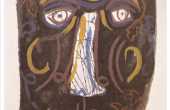Bethany
Contributing writer for The Artifice.
Junior Contributor I
- Articles
1 - Featured
0 - Comments
3
- Ext. Comments
3 - Processed
0 - Revisions
0
- Topics
1 - Topics Taken
0 - Notes
2
- Topics Proc.
0 - Topics Rev.
0
- Points
117 - Rank
X - Score
53
Latest Articles
Latest Topics
CW's "The 100" and Moral Relativity"The 100" has become known for its morally gray characters. In the TV show, warring clans often use the justification "[insert devastating action] was done for my people." However, "The 100's" stance is not so clear cut. Discuss the TV show's portrayal of moral relativism. Does "The 100" agree with the justifications characters provide for their actions (i.e. committing genocide "for [their] people")? Or does it want viewers to challenge the ideologies behind the "heroes" behavior? What evidence contributes to your conclusion, whether it be cinematography, symbolism, plot parallels, etc?
|
Latest Comments
| Can you Teach Someone how to Become a Writer? | |
This is something I have been thinking about more and more lately, and while I am still in my early years of earning an English degree, I have definitely already noticed this distinction in the works I study. Thankfully, I have professors who are well aware of the current divide and are actively working to provide more diversity in the classroom. Well done and very informative piece. | Genre Fiction in University Writing Programs: No longer the MFA's Red-headed Stepchild |
I read this book as a sophomore in high school, and even though I can’t remember every plot detail or symbol, I can remember the profound impact it had on me. Now that I am older the book’s messages about censorship, literature, knowledge, and human empathy seem even more relevant. My mother is an English teacher and she still faces people who try to censor the books she wants to teach–AMAZING books such as The Outsiders and To Kill a Mockingbird, and it reminds me why books like F451 are so important and will always be relevant. Literature is powerful. | Fahrenheit 451: What’s In a Tale? |

Very interesting read! When I was younger I definitely leaned toward the “no you can’t teach someone to be a writer” side of things, but I have definitely begun to move away from that stance. Just a few weeks ago I read an interesting piece in which Edgar Allen Poe broke down the process behind his composition of The Raven and it completely blew me away.